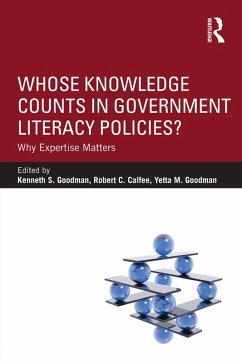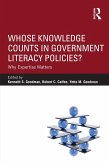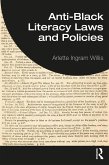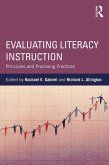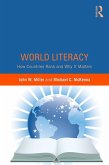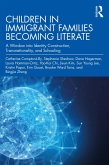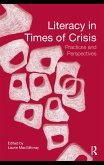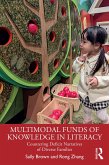Whose Knowledge Counts in Government Literacy Policies? (eBook, ePUB)
Why Expertise Matters
Redaktion: Goodman, Kenneth S.; Goodman, Yetta M.; Calfee, Robert C.
45,95 €
45,95 €
inkl. MwSt.
Sofort per Download lieferbar

23 °P sammeln
45,95 €
Als Download kaufen

45,95 €
inkl. MwSt.
Sofort per Download lieferbar

23 °P sammeln
Jetzt verschenken
Alle Infos zum eBook verschenken
45,95 €
inkl. MwSt.
Sofort per Download lieferbar
Alle Infos zum eBook verschenken

23 °P sammeln
Whose Knowledge Counts in Government Literacy Policies? (eBook, ePUB)
Why Expertise Matters
Redaktion: Goodman, Kenneth S.; Goodman, Yetta M.; Calfee, Robert C.
- Format: ePub
- Merkliste
- Auf die Merkliste
- Bewerten Bewerten
- Teilen
- Produkt teilen
- Produkterinnerung
- Produkterinnerung

Bitte loggen Sie sich zunächst in Ihr Kundenkonto ein oder registrieren Sie sich bei
bücher.de, um das eBook-Abo tolino select nutzen zu können.
Hier können Sie sich einloggen
Hier können Sie sich einloggen
Sie sind bereits eingeloggt. Klicken Sie auf 2. tolino select Abo, um fortzufahren.

Bitte loggen Sie sich zunächst in Ihr Kundenkonto ein oder registrieren Sie sich bei bücher.de, um das eBook-Abo tolino select nutzen zu können.
Whose knowledge is considered in framing government literacy policies which mandate accountability, in the form of standardized test scores? This book examines the degree to which expertise is being ignored and pseudo-science becoming the basis for literacy policies and laws.
- Geräte: eReader
- mit Kopierschutz
- eBook Hilfe
- Größe: 1.29MB
Andere Kunden interessierten sich auch für
![Whose Knowledge Counts in Government Literacy Policies? (eBook, PDF) Whose Knowledge Counts in Government Literacy Policies? (eBook, PDF)]() Whose Knowledge Counts in Government Literacy Policies? (eBook, PDF)45,95 €
Whose Knowledge Counts in Government Literacy Policies? (eBook, PDF)45,95 €![Anti-Black Literacy Laws and Policies (eBook, ePUB) Anti-Black Literacy Laws and Policies (eBook, ePUB)]() Arlette Ingram WillisAnti-Black Literacy Laws and Policies (eBook, ePUB)30,95 €
Arlette Ingram WillisAnti-Black Literacy Laws and Policies (eBook, ePUB)30,95 €![Evaluating Literacy Instruction (eBook, ePUB) Evaluating Literacy Instruction (eBook, ePUB)]() Evaluating Literacy Instruction (eBook, ePUB)52,95 €
Evaluating Literacy Instruction (eBook, ePUB)52,95 €![World Literacy (eBook, ePUB) World Literacy (eBook, ePUB)]() John W. MillerWorld Literacy (eBook, ePUB)51,95 €
John W. MillerWorld Literacy (eBook, ePUB)51,95 €![Children in Immigrant Families Becoming Literate (eBook, ePUB) Children in Immigrant Families Becoming Literate (eBook, ePUB)]() Catherine Compton-LillyChildren in Immigrant Families Becoming Literate (eBook, ePUB)41,95 €
Catherine Compton-LillyChildren in Immigrant Families Becoming Literate (eBook, ePUB)41,95 €![Literacy in Times of Crisis (eBook, ePUB) Literacy in Times of Crisis (eBook, ePUB)]() Literacy in Times of Crisis (eBook, ePUB)14,95 €
Literacy in Times of Crisis (eBook, ePUB)14,95 €![Multimodal Funds of Knowledge in Literacy (eBook, ePUB) Multimodal Funds of Knowledge in Literacy (eBook, ePUB)]() Sally BrownMultimodal Funds of Knowledge in Literacy (eBook, ePUB)41,95 €
Sally BrownMultimodal Funds of Knowledge in Literacy (eBook, ePUB)41,95 €-
-
-
Whose knowledge is considered in framing government literacy policies which mandate accountability, in the form of standardized test scores? This book examines the degree to which expertise is being ignored and pseudo-science becoming the basis for literacy policies and laws.
Dieser Download kann aus rechtlichen Gründen nur mit Rechnungsadresse in A, B, BG, CY, CZ, D, DK, EW, E, FIN, F, GR, HR, H, IRL, I, LT, L, LR, M, NL, PL, P, R, S, SLO, SK ausgeliefert werden.
Produktdetails
- Produktdetails
- Verlag: Taylor & Francis eBooks
- Seitenzahl: 237
- Erscheinungstermin: 1. Oktober 2013
- Englisch
- ISBN-13: 9781135096748
- Artikelnr.: 39681731
- Verlag: Taylor & Francis eBooks
- Seitenzahl: 237
- Erscheinungstermin: 1. Oktober 2013
- Englisch
- ISBN-13: 9781135096748
- Artikelnr.: 39681731
- Herstellerkennzeichnung Die Herstellerinformationen sind derzeit nicht verfügbar.
Kenneth S. Goodman is Professor Emeritus, Language, Reading and Culture, University of Arizona, USA. Robert C. Calfee is Professor Emeritus, Stanford University School of Education, USA. Yetta M. Goodman is Regents Professor Emerita, Language, Reading and Culture, University of Arizona, USA.
CONTENTS
Foreword: Joel Spring
Acknowledgments
Chapter 1: Introduction: Knowledge, Evidence, and Faith: How the Federal
Government Used Science to Take Over Public Schools, Robert Calfee
Part 1: The Political Realties
Chapter 2: Whose Knowledge Counts? The Pedagogy of the Absurd, Kenneth S.
Goodman
Chapter 3: Re-reading Poverty; Reorienting Educational Policy, Patrick
Shannon
Chapter 4: Neoliberal and Neoconservative Literacy Education Policies in
Contemporary France, Jacques Fijalkow
Chapter 5: Flying Blind: Government Policy on the Teaching of Reading in
England and Research on Effective Literacy Education, Henrietta Dombey
Chapter 6: Whose Knowledge Counts, For Whom, In What Circumstances?: The
Ethical Constraints on Who Decides, Sue Ellis
Chapter 7: About the Dubious Role of Phonological Awareness in the
Discussion of Literacy Policies, Renate Valtin
Part 2: Aspects of Literacy: The Knowledge Base
Chapter 8: The Role of Story and Literature in a World of Tests and
Standards, Kathy G. Short
Chapter 9: The Staircase Curriculum: Whole-School Collaboration to Improve
Literacy Achievement, Kathryn H. Au and Taffy E. Raphael
Chapter 10: Diversity in Children's Literature: What Does It Matter in
Today's Educational Climate? Rudine Sims Bishop
Chapter 11: Examining Three Assumptions about Text Complexity: Standard 10
of the Common Core State Standards, Elfrieda H. Hiebert and Katie Van Sluys
Chapter 12: The Role of Literature and Literary Reasoning in English
Language Arts and English Classrooms, Judith A. Langer
Chapter 13: Writing Teachers: The Roles Exploration, Evaluation, and Time
Play in Their Lives, Jane Hansen
Chapter 14: What Do Children Need to Succeed in Early Literacy-And Beyond?
William H. Teale, Jessica L. Hoffman, and Kathleen A. Paciga
Chapter 15: The Impact of Changing Conceptions of Language on Curriculum
and Instruction of Literacy and the Language Arts, David Bloome and Melissa
Wilson,
Comments: Nu!.... So!... Where do We Go from Here? Yetta M. Goodman
List of Contributors
Foreword: Joel Spring
Acknowledgments
Chapter 1: Introduction: Knowledge, Evidence, and Faith: How the Federal
Government Used Science to Take Over Public Schools, Robert Calfee
Part 1: The Political Realties
Chapter 2: Whose Knowledge Counts? The Pedagogy of the Absurd, Kenneth S.
Goodman
Chapter 3: Re-reading Poverty; Reorienting Educational Policy, Patrick
Shannon
Chapter 4: Neoliberal and Neoconservative Literacy Education Policies in
Contemporary France, Jacques Fijalkow
Chapter 5: Flying Blind: Government Policy on the Teaching of Reading in
England and Research on Effective Literacy Education, Henrietta Dombey
Chapter 6: Whose Knowledge Counts, For Whom, In What Circumstances?: The
Ethical Constraints on Who Decides, Sue Ellis
Chapter 7: About the Dubious Role of Phonological Awareness in the
Discussion of Literacy Policies, Renate Valtin
Part 2: Aspects of Literacy: The Knowledge Base
Chapter 8: The Role of Story and Literature in a World of Tests and
Standards, Kathy G. Short
Chapter 9: The Staircase Curriculum: Whole-School Collaboration to Improve
Literacy Achievement, Kathryn H. Au and Taffy E. Raphael
Chapter 10: Diversity in Children's Literature: What Does It Matter in
Today's Educational Climate? Rudine Sims Bishop
Chapter 11: Examining Three Assumptions about Text Complexity: Standard 10
of the Common Core State Standards, Elfrieda H. Hiebert and Katie Van Sluys
Chapter 12: The Role of Literature and Literary Reasoning in English
Language Arts and English Classrooms, Judith A. Langer
Chapter 13: Writing Teachers: The Roles Exploration, Evaluation, and Time
Play in Their Lives, Jane Hansen
Chapter 14: What Do Children Need to Succeed in Early Literacy-And Beyond?
William H. Teale, Jessica L. Hoffman, and Kathleen A. Paciga
Chapter 15: The Impact of Changing Conceptions of Language on Curriculum
and Instruction of Literacy and the Language Arts, David Bloome and Melissa
Wilson,
Comments: Nu!.... So!... Where do We Go from Here? Yetta M. Goodman
List of Contributors
CONTENTS
Foreword: Joel Spring
Acknowledgments
Chapter 1: Introduction: Knowledge, Evidence, and Faith: How the Federal
Government Used Science to Take Over Public Schools, Robert Calfee
Part 1: The Political Realties
Chapter 2: Whose Knowledge Counts? The Pedagogy of the Absurd, Kenneth S.
Goodman
Chapter 3: Re-reading Poverty; Reorienting Educational Policy, Patrick
Shannon
Chapter 4: Neoliberal and Neoconservative Literacy Education Policies in
Contemporary France, Jacques Fijalkow
Chapter 5: Flying Blind: Government Policy on the Teaching of Reading in
England and Research on Effective Literacy Education, Henrietta Dombey
Chapter 6: Whose Knowledge Counts, For Whom, In What Circumstances?: The
Ethical Constraints on Who Decides, Sue Ellis
Chapter 7: About the Dubious Role of Phonological Awareness in the
Discussion of Literacy Policies, Renate Valtin
Part 2: Aspects of Literacy: The Knowledge Base
Chapter 8: The Role of Story and Literature in a World of Tests and
Standards, Kathy G. Short
Chapter 9: The Staircase Curriculum: Whole-School Collaboration to Improve
Literacy Achievement, Kathryn H. Au and Taffy E. Raphael
Chapter 10: Diversity in Children's Literature: What Does It Matter in
Today's Educational Climate? Rudine Sims Bishop
Chapter 11: Examining Three Assumptions about Text Complexity: Standard 10
of the Common Core State Standards, Elfrieda H. Hiebert and Katie Van Sluys
Chapter 12: The Role of Literature and Literary Reasoning in English
Language Arts and English Classrooms, Judith A. Langer
Chapter 13: Writing Teachers: The Roles Exploration, Evaluation, and Time
Play in Their Lives, Jane Hansen
Chapter 14: What Do Children Need to Succeed in Early Literacy-And Beyond?
William H. Teale, Jessica L. Hoffman, and Kathleen A. Paciga
Chapter 15: The Impact of Changing Conceptions of Language on Curriculum
and Instruction of Literacy and the Language Arts, David Bloome and Melissa
Wilson,
Comments: Nu!.... So!... Where do We Go from Here? Yetta M. Goodman
List of Contributors
Foreword: Joel Spring
Acknowledgments
Chapter 1: Introduction: Knowledge, Evidence, and Faith: How the Federal
Government Used Science to Take Over Public Schools, Robert Calfee
Part 1: The Political Realties
Chapter 2: Whose Knowledge Counts? The Pedagogy of the Absurd, Kenneth S.
Goodman
Chapter 3: Re-reading Poverty; Reorienting Educational Policy, Patrick
Shannon
Chapter 4: Neoliberal and Neoconservative Literacy Education Policies in
Contemporary France, Jacques Fijalkow
Chapter 5: Flying Blind: Government Policy on the Teaching of Reading in
England and Research on Effective Literacy Education, Henrietta Dombey
Chapter 6: Whose Knowledge Counts, For Whom, In What Circumstances?: The
Ethical Constraints on Who Decides, Sue Ellis
Chapter 7: About the Dubious Role of Phonological Awareness in the
Discussion of Literacy Policies, Renate Valtin
Part 2: Aspects of Literacy: The Knowledge Base
Chapter 8: The Role of Story and Literature in a World of Tests and
Standards, Kathy G. Short
Chapter 9: The Staircase Curriculum: Whole-School Collaboration to Improve
Literacy Achievement, Kathryn H. Au and Taffy E. Raphael
Chapter 10: Diversity in Children's Literature: What Does It Matter in
Today's Educational Climate? Rudine Sims Bishop
Chapter 11: Examining Three Assumptions about Text Complexity: Standard 10
of the Common Core State Standards, Elfrieda H. Hiebert and Katie Van Sluys
Chapter 12: The Role of Literature and Literary Reasoning in English
Language Arts and English Classrooms, Judith A. Langer
Chapter 13: Writing Teachers: The Roles Exploration, Evaluation, and Time
Play in Their Lives, Jane Hansen
Chapter 14: What Do Children Need to Succeed in Early Literacy-And Beyond?
William H. Teale, Jessica L. Hoffman, and Kathleen A. Paciga
Chapter 15: The Impact of Changing Conceptions of Language on Curriculum
and Instruction of Literacy and the Language Arts, David Bloome and Melissa
Wilson,
Comments: Nu!.... So!... Where do We Go from Here? Yetta M. Goodman
List of Contributors
